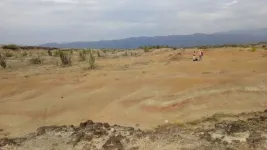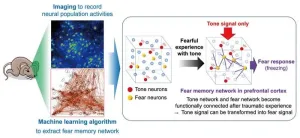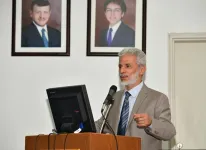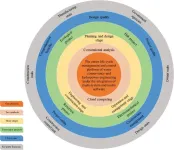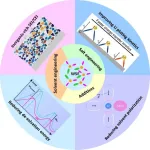(Press-News.org) Physicists have shown that simulating models of hypothetical time travel can solve experimental problems that appear impossible to solve using standard physics.
If gamblers, investors and quantum experimentalists could bend the arrow of time, their advantage would be significantly higher, leading to significantly better outcomes.
Researchers at the University of Cambridge have shown that by manipulating entanglement – a feature of quantum theory that causes particles to be intrinsically linked – they can simulate what could happen if one could travel backwards in time. So that gamblers, investors and quantum experimentalists could, in some cases, retroactively change their past actions and improve their outcomes in the present.
Whether particles can travel backwards in time is a controversial topic among physicists, even though scientists have previously simulated models of how such spacetime loops could behave if they did exist. By connecting their new theory to quantum metrology, which uses quantum theory to make highly sensitive measurements, the Cambridge team has shown that entanglement can solve problems that otherwise seem impossible. The study appears in Physical Review Letters.
“Imagine that you want to send a gift to someone: you need to send it on day one to make sure it arrives on day three,” said lead author David Arvidsson-Shukur, from the Cambridge Hitachi Laboratory. “However, you only receive that person’s wish list on day two. So, in this chronology-respecting scenario, it’s impossible for you to know in advance what they will want as a gift and to make sure you send the right one.
“Now imagine you can change what you send on day one with the information from the wish list received on day two. Our simulation uses quantum entanglement manipulation to show how you could retroactively change your previous actions to ensure the final outcome is the one you want.”
The simulation is based on quantum entanglement, which consists of strong correlations that quantum particles can share and classical particles—those governed by everyday physics—cannot.
The particularity of quantum physics is that if two particles are close enough to each other to interact, they can stay connected even when separated. This is the basis of quantum computing – the harnessing of connected particles to perform computations too complex for classical computers.
“In our proposal, an experimentalist entangles two particles,” said co-author Nicole Yunger Halpern, researcher at the National Institute of Standards and Technology (NIST) and the University of Maryland. “The first particle is then sent to be used in an experiment. Upon gaining new information, the experimentalist manipulates the second particle to effectively alter the first particle’s past state, changing the outcome of the experiment.”
“The effect is remarkable, but it happens only one time out of four!” said Arvidsson-Shukur. “In other words, the simulation has a 75% chance of failure. But the good news is that you know if you have failed. If we stay with our gift analogy, one out of four times, the gift will be the desired one (for example a pair of trousers), another time it will be a pair of trousers but in the wrong size, or the wrong colour, or it will be a jacket.”
To give their model relevance to technologies, the theorists connected it to quantum metrology. In a common quantum metrology experiment, photons—small particles of light—are shone onto a sample of interest and then registered with a special type of camera. If this experiment is to be efficient, the photons must be prepared in a certain way before they reach the sample. The researchers have shown that even if they learn how to best prepare the photons only after the photons have reached the sample, they can use simulations of time travel to retroactively change the original photons.
To counteract the high chance of failure, the theorists propose to send a huge number of entangled photons, knowing that some will eventually carry the correct, updated information. Then they would use a filter to ensure that the right photons pass to the camera, while the filter rejects the rest of the ‘bad’ photons.
“Consider our earlier analogy about gifts,” said co-author Aidan McConnell, who carried out this research during his master’s degree at the Cavendish Laboratory in Cambridge, and is now a PhD student at ETH, Zürich. “Let’s say sending gifts is inexpensive and we can send numerous parcels on day one. On day two we know which gift we should have sent. By the time the parcels arrive on day three, one out of every four gifts will be correct, and we select these by telling the recipient which deliveries to throw away.”
“That we need to use a filter to make our experiment work is actually pretty reassuring,” said Arvidsson-Shukur. “The world would be very strange if our time-travel simulation worked every time. Relativity and all the theories that we are building our understanding of our universe on would be out of the window.
“We are not proposing a time travel machine, but rather a deep dive into the fundamentals of quantum mechanics. These simulations do not allow you to go back and alter your past, but they do allow you to create a better tomorrow by fixing yesterday’s problems today.”
This work was supported by the Sweden-America Foundation, the Lars Hierta Memorial Foundation, Girton College, and the Engineering and Physical Sciences Research Council (EPSRC), part of UK Research and Innovation (UKRI).
END
Simulations of ‘backwards time travel’ can improve scientific experiments
2023-10-12
ELSE PRESS RELEASES FROM THIS DATE:
Extraordinary fossil find reveals details about the weight and diet of extinct saber-toothed marsupial
2023-10-12
Recent paleontological explorations in the Tatacoa Desert in Colombia led to the recovery of the most complete skeleton of a "saber-toothed marsupial” discovered in northern South America. The specimen belongs to the species Anachlysictis gracilis, which is part of a group of extinct predatory mammals known as sparassodonts, that lived in South America during the Cenozoic, after the extinction of the dinosaurs.
This species lived approximately 13 million years ago in the area known among paleontologists as ‘La Venta’, in the current La Tatacoa desert, a tropical dry forest that “at that time was a tropical rainforest, similar to the current Amazon,” said ...
Traumatic memories can rewire the brain
2023-10-12
Okazaki, Japan – Scientists have long speculated about the physical changes that occur in the brain when a new memory is formed. Now, research from the National Institute for Physiological Sciences (NIPS) has shed light on this intriguing neurological mystery.
In a study recently published in Nature Communications, The research team has succeeded in detecting the brain neuronal networks involved in trauma memory by using a novel method that combines optical and machine-learning-based approaches, capturing the complex changes that occur during memory formation and uncovering the mechanisms by which trauma memories ...
Could you correctly identify someone wearing sunglasses from a distance of 20 meters?
2023-10-12
This comprehensive study focused on three key factors: distance, lighting and facial masking, and their impact on the ability of eyewitnesses to later correctly identify individuals they have seen. In the study, eyewitnesses were asked to identify perpetrators they had seen from various distances (5, 12.5 or 20 metres) and in different lighting conditions (daylight or deep twilight). The perpetrators were shown both with and without facial masking (sunglasses, hood, or both sunglasses and hood).
The key finding of the study is that distance plays a crucial role – the longer the distance, the harder it is ...
Children with prediabetes and obesity may be more likely to progress to diabetes
2023-10-12
A new Journal of the Endocrine Society study highlights how to identify children at high risk of developing type 2 diabetes and strategies for prevention, such as anti-obesity or anti-diabetes medication and lifestyle changes.
Prediabetes is a health condition in which blood sugar levels are higher than normal, but not yet high enough to be diagnosed as type 2 diabetes. Prediabetes increases the risk of developing chronic kidney disease, heart disease and stroke. Around 5%-10% of adults with prediabetes develop diabetes each year.
Over the past three decades, there has been a sharp increase in the incidence and prevalence ...
Hostile sexism linked to less responsive parenting
2023-10-12
Fathers and mothers who believe that men should hold the power and authority in the family exhibit less responsive parenting behavior, according to a new article in Social Psychological and Personality Science. This research provides the first behavioral evidence demonstrating that hostile sexism is linked to less responsive parenting by both fathers and mothers.
Hostile sexism is characterized by beliefs that men should hold power and authority in society. Its harmful effects are well-established, especially in predicting harmful behavior toward women. However, this new research highlights its impact on parenting ...
Study: Struggling students who repeat third grade see improved achievement
2023-10-12
Washington, October 12, 2023—Third-grade retention can increase the reading and math scores of struggling students, with positive effects lasting into middle school, according to new research released today. The study, by NaYoung Hwang at the University of New Hampshire and Cory Koedel at the University of Missouri, was published today in Educational Evaluation and Policy Analysis, a peer-reviewed journal of the American Educational Research Association.
Video: Co-author NaYoung Hwang discusses findings and implications of the study
Despite mixed reviews among policymakers, researchers, ...
New center addresses global climate change impacts on water, other resources
2023-10-12
Jordan ranks second among countries with the lowest access to water and is expected to reach water insecurity by 2030. Within the country, the most water deprived communities live in the Northeast region of Mafraq’s Azraq Basin which is also home to approximately 120,000 resettled Syrian refugees who are dependent on water resources.
A new three-year program called the Global Center on Climate Change, Water, Energy, Food, and Health Systems, led by the University of California San Diego Herbert Wertheim School of Public Health and Human ...
NIH research program All of Us establishes CU Anschutz-led Center aimed at better utilizing data
2023-10-12
AURORA, Colo. (October 12, 2023) – The National Institutes of Health’s All of Us Research Program has awarded $30 million to the University of Colorado Anschutz Medical Campus and its partners to establish the Center for Linkage and Acquisition of Data (CLAD). The All of Us Research Program is a historic effort to enroll at least 1 million people who reflect the diversity of the United States. Providing researchers with the data will help drive new discoveries and advance precision medicine.
“This is ...
Team develops HydroBIM platform for design of hydropower hub buildings
2023-10-12
A research team has developed a platform based on building information modeling (BIM) technology for use in the design of hydropower hub buildings. The platform, called HydroBIM, combines BIM technology with geographic information systems, computer-aided engineering, internet of things, artificial intelligence, and other technologies. The HydroBIM platform provides a comprehensive approach to digital design, intelligent construction, and smart operation of hydropower engineering projects.
The work ...
Stronger lithium batteries may need ‘weaker’ solvation structure, researchers report
2023-10-12
Lithium batteries power our phones, computers, many of our cars and so much more — even the drill and weedwhacker. But as technology advances, can they keep up in their current format? No, but there is a way forward, according to a new review paper from researchers at Hong Kong Polytechnic University, by further developing the electrolytes that allow for energy storage and discharge.
The team published their work in Energy Materials and Devices on September 18, 2023.
“Lithium batteries ...
